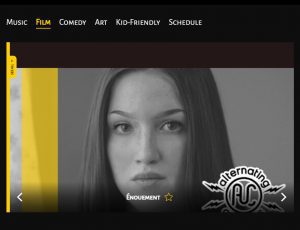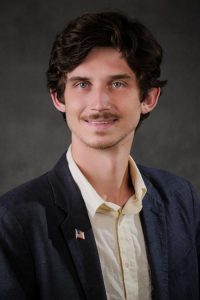Head of Illinois Film Office and 29 Flicks Are Coming Attractions at Alternating Currents Fest
Despite the brutal Covid pandemic, film and TV production in Illinois last year spent nearly $362 million, down 35% from about $560 million spent in 2019. Doug Miller of Davenport – who heads the Quad Cities Production Coalition – wants to see some of that money come to the Illinois Q-C area.

The Alternating Currents Festival, Aug. 19-22, has expanded beyond downtown Davenport, to include Rock Island and Moline.
He is working with state and local officials on establishing a regional film office in Rock Island, and is bringing Illinois Film Office director Peter Hawley to the Rock Island Holiday Inn on Thursday, Aug. 19, to talk about state filming incentives and financing. It’s among first events in the Quad-Cities Alternating Currents festival.
“If you’re interested in movies, we want to pack the place with people,” Miller, a longtime film and media consultant, said recently. “We have to start getting our act together.”
At 5 p.m. to 7 p.m., in a first-floor conference room at Holiday Inn (226 17th St., Rock Island), Hawley (state film office head since May 2019) will speak and answer questions with Ted Reilly, an entrepreneur, film financier, and producer. As executive director of Chicago Media Angels, he’s focused on organizing, educating, and accelerating savvy media investors in the

Alternating Currents feature more than 100 free events at 20-plus downtown Davenport venues. Learn more at alternatingcurrentsqc.com.
Midwest.
Reilly serves on the board of Stage18 Chicago, a non-profit organization dedicated to providing education, community, office space, resources, and employment opportunities to independent filmmakers, visual artists, and entrepreneurs. He has produced dozens of independent feature films, television pilots and new media titles including “Come as You Are,” “Public Housing Unit,” and “The Porch.”
“I like Western Illinois and I like the Quad-Cities,” Hawley said in a recent interview. “And I have been a big advocate for creating more film production in Western Illinois and around the state. And so, I’ve gone out there several times since I’ve been on the job for the last two years, and met with union officials and Doug, and other people in in the film industry, and he put together this panel discussion during Alternating Currents.”
Hawley has a personal connection to the Q-C, since his parents live in Bettendorf (they moved there after his dad got a job in the early ‘80s), and Peter worked during summers after his first two years in college at what is now KWQC-TV. He said it’s been hard to attract film and TV

Peter Hawley, a filmmaker himself, has been director of the Illinois Film Office since May 2019.
production to Illinois outside the booming Chicago area.
“It’s challenging because so many places around the state outside of Chicago, do not have the infrastructure and by infrastructure I mean the studio facilities and the crew base,” Hawley said. “But that said, because we’re doing more and more production and overall in the state there’s more production and there’s more infrastructure. It’s getting easier and easier, and Hollywood is ultimately going to chase the dollar and they like it here and you’re having a really gangbuster year and they’re going to want to come to Illinois.” “I think the Illinois Quad-Cities has a lot to offer for film production,” he said of potential locations and workforce.
Statewide, there were 7,780 production hires in 2020, not including extras, compared to 15,168 hires in 2019, according to film office data. Film officials said more than 1,775 local jobs were

Ted Reilly is an entrepreneur, film financier, producer, and executive director of Chicago Media Angels.
added in the first few months of 2021.
Data for TV, film and media production in 2020 reveals the expected decline in expenditures by the film industry. However, even accounting for the 6 months when production was paused due to Covid, Illinois maintained over 200 film projects, yielding over $360 million in estimated expenditures and 7,780 non-extra jobs hires generated by the film industry. By the end of 2020, film production had resumed for many shows – including the return of award-winning FX series, “Fargo;” NBC’s multiple “Chicago” series; and major studio feature “The Batman.”
“The bounce back of filming in Illinois is a testament to effective health guidelines, the expansion of and availability of testing and vaccines, and local leadership committed to addressing the needs of the film industry, which is important to the local economy,” according to the state Department of Commerce and Economic Opportunity. “In the film industry, Illinois was a local adopter of public health guidelines allowing industries to return after necessary public health closures. Filming returned last year with guidelines provided through the State of Illinois’ Restore Illinois framework – which allowed permitting and many preproduction operations to resume.
Illinois offers 30% tax credit
The Illinois Film Office awards a 30-percent tax credit for qualified production spending and labor expenditures, up to $100,000 per worker, within the state of Illinois. Gov. Pritzker extended the credit in 2019 to Dec. 31, 2026. Applicants can receive an additional 15% tax credit on salaries paid to individuals (earning at least $1,000 in total wages) who live in economically disadvantaged areas, whose unemployment rate

A short film, “Enounement,” by Detroit-based 2021 college grad Chloe Heikkinen, is part of the 29-film lineup for Alternating Currents.
is at least 150% of the state’s annual average.
Last winter, productions in the state were doing over 5,000 Covid tests a week, and had fewer than 10 positive cases each week, Hawley said recently.
“This is in the middle of it all. So they did a great job of tracking it and then as soon as they got a positive test, they would remove people for two weeks and continue on,” he said. “It was a coordinated effort between the state, the city, and the unions and Hollywood and it really worked out. And again I really, I have always said we owe a big thanks to ‘Fargo’ because they came back and did it first and showed everyone that it was possible to do a large production safely and after they came and finished up, the floodgates opened.”
“The film and television industry in Illinois is very, very safe and I think we as a state can compare their safety record over with almost any other industry because of the rigor, they go through things,” Hawley said of testing and safety protocols. “I can’t say that they are mandating vaccinations; that may come down the road, but I don’t have any say in that.”
At the Aug. 19 event, he will discuss the Illinois tax credits and how filmmakers and companies can take advantage of it, and Reilly as an investor, will discuss how to use the tax incentives and film financing.
Hawley is an award-winning writer and director of feature films, TV commercials and documentaries. As an undergraduate at Northwestern University, he won a national student Emmy Award for his music video Next to You, and several awards and festival appearances for his short film The Law of Inertia. The success of these projects gave him the opportunity to write and direct the feature film, Victimless Crimes.
In 1996, Hawley joined the faculty of Columbia College in Chicago, teaching across the entire film curriculum. In 2007 he became one of the “Original Seven” hires at Tribeca Flashpoint College in Chicago. He was named Academic Dean in 2014, and became Dean of Columbia College Hollywood in 2016. In 2017, he successfully merged the two schools to create one college with two campuses.

Peter Hawley of the Illinois Film Office and Chicago-based film financier Ted Reilly will speak to people interested in the film industry Thursday, Aug. 19 at the Rock Island Holiday Inn.
In his role as director of the Illinois Film Office, Peter and his team strive to make Illinois the best state in the country for film and television production. In addition, the IFO is actively trying to build the infrastructure needed, film studios and production crews, to attract projects to Illinois from around the country and around the world.
In the 2021 Illinois legislative session, state Rep. Mike Halpin (D-Rock Island) helped secure $100,000 for northwest Illinois film production, including $65,000 specifically for the Q-C, which will mainly be used for marketing, Miller said.

Dylan Parker was first elected to the Rock Island City Council in 2017, representing the Fifth Ward.
“We need to tell the world where we’re at,” he said. “We know we’ve got the people. We need to quantify who we have, and jump-start or help people in film world.”
Rock Island Ald. Dylan Parker has been working with Miller since late 2019 on ways the film office could be set up in downtown Rock Island,
“My role as a city council member is to identify strategic ways the city can expand its local economy. The state of Illinois obviously targets this industry with tax incentives,” he said Thursday. “If the state is incentivizing this, we at the local level should piggy-back on that, secure the economic activity in Rock Island.”
Parker anticipates working with the Quad Cities Chamber, Visit Quad Cities, and the city to coordinate efforts, and figure out how a Q-C Film Office would be structured and governed.
“We have some funding from the state, so what do we do with that money? We need to come up with a plan, sort of who does what and when,” he said, noting a Q-C film website should be a priority. They need to partner with people already working in film and media production in the area, to get their feedback and support, Parker said.
“I am really looking forward to seeing everyone from Quad-Cities interested in the film industry and production world,” he said of the Aug. 19 event. “I see my job on city council as being a conduit, making the connections, to connect local people who are interested in the economy, with the director of the Illinois Film Office. I’m looking forward to seeing where this goes. If we could get a portion of the growth of that economy, that would be fabulous for our local economy.”
Film programming for Alternating Currents
Michael Mehuys, Alternating Currents Film Festival programming director, is happy to hear of progress on the Q-C film front.
“Hearing that there’s interest in forming a QC film office is great news — additional footholds for local filmmakers to get assistance and

The first Alternating Currents Film Festival in 2018 was capped off by Bettendorf natives Scott Beck, left, and Bryan Woods, showing their hit thriller “A Quiet Place” and doing a Q & A.
encouragement are some things that Alternating Currents Film Festival and Cinema at the Figge has hoped to enable,” he said this week.
The AC film selection (the 2018 fest hosted “A Quiet Place” filmmakers Scott Beck and Bryan Woods) started with film submissions, and they used FilmFreeway, with 75 shorts and features sent in from around the world, Mehuys said. Twenty-nine films were selected, in the following categories — Short Narrative and Student Films, and Experimental Films.
“While it would be great to include all submissions each year, this year I chose roughly 1/3 of our total submissions, based on what merits I felt the films had regarding unique voices/perspectives, interesting filmmaking techniques being highlighted, and with some focus on regionally produced films,” Mehuys said. All Alternating Currents activities are free, and festgoers can look forward to seeing films Friday, Aug. 20, and Saturday, Aug. 21 at the Figge Art Museum’s John Deere Auditorium on the 2nd floor, as well as the new venue, Mockingbird on Main, 320 Main St., Davenport.
The Figge (225 W. 2nd St., Davenport) will feature the Narrative/Documentary Shorts on Friday evening, as well as Saturday and Sunday morning. The experimental films will screen outdoors

Moline-based Fourth Wall Films’ documentary, “A Bridge Too Far From Hero Street,” is part of the new Alternating Currents Film Festival in Davenport.
(as in 2019) at the EICC Urban Campus (on 3rd Street) on Friday and Saturday nights; stop by once the sun goes down. Mockingbird on Main will be hosting the Experimental program Friday and Saturday nights indoors.
Among films and filmmakers from the Midwest region, Mehuys said, are: “10/31/2020” by Jason Christ, “Sticks and Stones” by Chris Hutton, “Creep” by Hannah Rosalie Wright, “A Bridge Too Far From Hero Street” by Kelly and Tammy Rundle, “Over Under” by Luke and Kurt Oberhaus, and “Enounement” by 2021 college grad Chloe Heikkinen.
“We hope to see as many of the filmmakers come by to see their films screen as are comfortable in doing so,” he said. Davenport composer Bill Campbell will present the Oscar-nominated “Hunger Ward” at 4 p.m. Saturday at the Figge. This is after the festival shorts run from 11 a.m.-3 p.m., and after he plays in the lobby at the Figge, at 1:30 p.m.
The 2020 documentary for which he wrote music, “Hunger Ward,” was among five 93rd-annual Academy Award nominees for Best Documentary, Short Subject. Campbell (a music professor at St. Ambrose University) was among the film crew that attended the 91st-annual Oscars ceremony in Los Angeles, in February 2019, when the second film in the refugee trilogy, “Lifeboat” (2018), was nominated in the same category.
For a complete listing of musical artists, films and other activities scheduled for Alternating Currents (Aug. 19 to 22), visit www.alternatingcurrentsqc.com.









